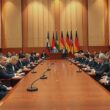A pro-Russian hacking group has targeted key German public sector websites, including the central procurement portal, in a series of Distributed Denial of Service (DDoS) attacks, raising serious questions about the nation’s digital resilience and the potential for escalation in politically motivated cyber warfare. Sources within German security agencies, cited by “Süddeutsche Zeitung”, revealed the attacks rendered the procurement portal temporarily inaccessible, disrupting a critical interface between the government and the private sector.
The German Federal Office for Information Security (BSI) confirmed the incident, stating it was informed of an IT security breach linked to the procurement platform and is collaborating with the operating authority. The Federal Interior Ministry also acknowledged the “IT security incident” while authorities have refrained from disclosing details regarding potential damages. Despite initial reports, security sources assert that no data breach or successful compromise of systems has occurred, characterizing the disruption as primarily an availability issue now reportedly resolved.
The timing and messaging of the attacks strongly suggest a direct response to Germany’s provision of Patriot air defense systems to Ukraine. Evidence left by the hackers reportedly points to this motivation, highlighting a concerning demonstration of how geopolitical tensions are increasingly translated into digital aggression.
The scope of the attacks extends beyond the central procurement portal, encompassing websites managed by the Bavarian state government, the state parliament of Saxony-Anhalt and various federal police authorities. The silence from these affected entities raises concerns about preparedness and coordinated response capabilities within regional administrative bodies.
The German military, the Bundeswehr, confirmed awareness of attacks on procurement websites, emphasizing that classified information isn’t hosted on publicly accessible platforms. While the Bundeswehr’s own IT infrastructure remains unaffected, the incident underscores the vulnerability of interconnected digital ecosystems and the potential for cascading effects.
This latest series of attacks follows a previous international crackdown on the same hacking group earlier this year, indicating a persistent and evolving threat. This event reinforces the urgent need for Germany to reassess its cyber defense strategies, prioritize hardening critical infrastructure and implement more robust incident response protocols to effectively counter politically motivated cyberattacks and safeguard vital governmental functions. The lack of public statements from many targeted agencies also invites scrutiny regarding transparency and the effectiveness of Germany’s overall cyber security posture.





